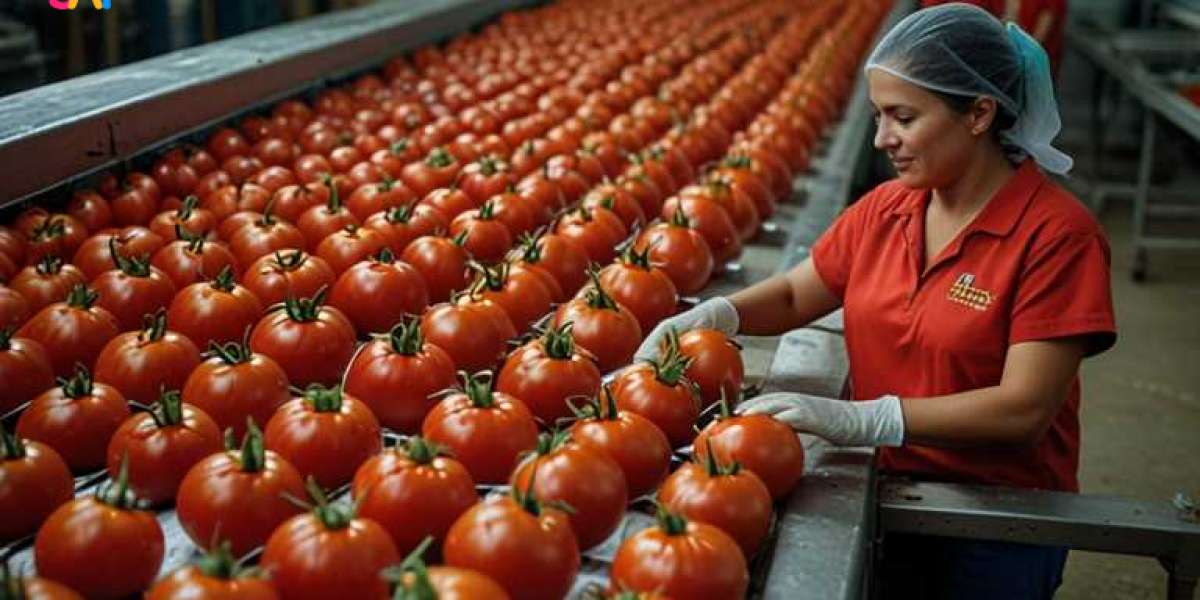IMARC Group’s “Tomato Processing Plant Project Report 2025: Industry Trends, Plant Setup, Machinery, Raw Materials, Investment Opportunities, Cost and Revenue” report provides a comprehensive guide on how to successfully set up a tomato processing plant setup. The report offers clarifications on various aspects, such as unit operations, raw material requirements, utility supply, infrastructural needs, machinery models, labour necessities, transportation timelines, packaging costs, etc.
In addition to the operational aspects, the report also provides in-depth insights into tomato processing process, project economics, encompassing vital aspects such as capital investments, project funding, operating expenses, income and expenditure projections, fixed and variable costs, direct and indirect expenses, expected ROI, net present value (NPV), profit and loss account, and thorough financial analysis, among other crucial metrics. With this comprehensive roadmap, entrepreneurs and stakeholders can make informed decisions and venture into a successful tomato processing unit.
Request a Sample Report: https://www.imarcgroup.com/tomato-processing-plant-project-report/requestsample
What is Tomato Processing?
A tomato processing plant is a highly specialized industrial facility designed to convert fresh tomatoes into a variety of value-added food products. Through a systematic series of operations—such as washing, sorting, peeling, crushing, and concentrating—the raw tomatoes are transformed into widely used commodities like tomato paste, puree, ketchup, juice, sauces, and canned tomatoes. The plant utilizes advanced processing techniques such as hot break and cold break methods, which are selected based on the desired characteristics of the final product. Equipment like pulpers, evaporators, sterilizers, and aseptic fillers are integrated into the process to ensure product integrity, hygiene, and extended shelf life. Typically, these plants operate in sync with peak harvest seasons to enhance efficiency and reduce waste, playing a critical role in the farm-to-factory ecosystem. Besides serving the retail food industry, processed tomato products are essential for large-scale food service providers and institutional kitchens. Today’s tomato processing plants are also subject to rigorous quality assurance protocols, food safety standards, and sustainability measures. Their presence not only boosts agricultural profitability but also contributes to rural development by creating employment and minimizing post-harvest losses in tomato-growing regions.
Market Trend and Drivers of Tomato Processing:
The global market for tomato processing plants is experiencing substantial growth, driven by rising consumer demand for ready-to-use, tomato-based products and rapid technological advancements in food processing. Urban lifestyles and evolving food preferences have led to a surge in the consumption of convenient items like sauces, purees, and pastes, particularly in fast-growing urban centers and developing economies. Simultaneously, the growth of the fast food and food service sectors is fueling continuous demand for bulk tomato ingredients. Export opportunities have also expanded due to the globalization of supply chains, allowing producers to tap into international markets. Modern innovations in machinery have enhanced production efficiency, improved product quality, and reduced operational costs, encouraging broader adoption of automated processing lines. Environmental and economic concerns—such as reducing food waste and managing seasonal supply fluctuations—are prompting investments in regional processing units. Additionally, government incentives and infrastructure development are fostering the establishment and modernization of plants in both mature and emerging markets. The shift toward clean-label and preservative-free products has also encouraged manufacturers to adopt more natural and sustainable processing techniques. Together, these trends underline the strong and ongoing expansion of the tomato processing plant industry worldwide.
Key Aspects to Setup a Tomato Processing Plant:
- Location to Setup Plant
- Market Research
- Plant Layout
- Construction and Infrastructure
- Equipment/Machinery Procurement
- Documentation and Licenses
- Cost Analysis
Requirements to Setup a Facility:
- Funds
- Machinery
- Lands
Types of Costs to Setting up a Tomato Processing Factory:
- Land, Location and Site Development Cost
- Plant Layout Cost
- Machinery Requirements and Costs
- Raw Material Requirements and Costs
- Packaging Requirements and Costs
- Transportation Requirements and Costs
- Utility Requirements and Costs
- Human Resource Requirements and Costs
Project Economics:
- Capital Investments
- Operating Costs
- Expenditure Projections
- Revenue Projections
- Taxation and Depreciation
- Profit Projections
- Financial Analysis
Key Questions Answered in the Report:
- How has the tomato market performed so far and how will it perform in the coming years?
- What is the market segmentation of the global tomato market?
- What is the regional breakup of the global tomato market?
- What are the price trends of various feedstocks in the tomato industry?
- What is the structure of the tomato industry and who are the key players?
- What are the various unit operations involved in a tomato processing plant?
- What is the total size of land required for setting up a tomato processing plant?
- What is the layout of a tomato processing plant?
- What are the machinery requirements for setting up a tomato processing plant?
- What are the raw material requirements for setting up a tomato processing plant?
- And more…
Ask Analyst for Customized Report: https://www.imarcgroup.com/request?type=reportid=8858flag=C
How IMARC Can Help?
IMARC Group is a global management consulting firm that helps the world’s most ambitious changemakers to create a lasting impact. The company provide a comprehensive suite of market entry and expansion services. IMARC offerings include thorough market assessment, feasibility studies, company incorporation assistance, factory setup support, regulatory approvals and licensing navigation, branding, marketing and sales strategies, competitive landscape and benchmarking analyses, pricing and cost research, and procurement research.
Services:
- Plant Setup
- Factoring Auditing
- Regulatory Approvals, and Licensing
- Company Incorporation
- Incubation Services
- Recruitment Services
- Marketing and Sales
Contact Us:
IMARC Group
134 N 4th St. Brooklyn, NY 11249, USA
Email: [email protected]
Tel No:(D) +91 120 433 0800
United States: +1-631-791-1145




